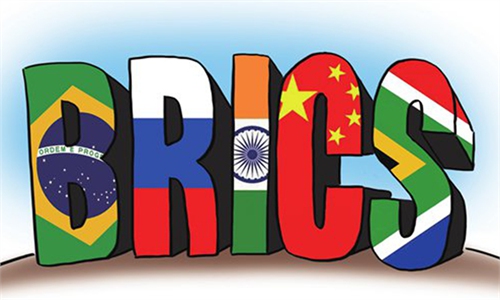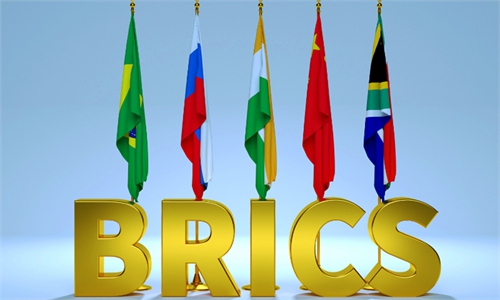
The Sandton Convention Centre in Johannesburg, South Africa, where the 2023 BRICS Summit is hosted, August 20, 2023. Photo: IC
Editor notes:A BRICS summit has never sparked as much worldwide attention as its 15th summit, which kicked off on Tuesday in Johannesburg, South Africa. Why are more and more countries hoping to join BRICS? What has BRICS achieved in these areas in recent years? What is the prospect of a BRICS common currency? With these questions in mind, Global Times (GT) reporter Su Yaxuan recently interviewed Paulo Nogueira Batista Jr. (Nogueira), a Brazilian economist. He was also the vice president of the New Development Bank (NDB) from 2015 to 2017.
GT: How do you interpret the significance of this summit? What are your expectations for this summit?
Nogueira: I believe it will be one of the most significant summits in the history of the BRICS. The evolution of the geopolitical world context, including the war in Ukraine, the rise of China and the increasingly difficult relations of China with the US, as well as the return of Luiz Inacio Lula da Silva to the presidency of Brazil, have given a renewed importance to the group. The two most important new or relatively new topics discussed by the leaders are the expansion of BRICS and the possible new BRICS currency.
GT: BRICS expands with six new members, including Argentina, Iran, UAE, Saudi Arabia, Ethiopia and Egypt. Why are more and more countries hoping to join BRICS?
Nogueira: This desire by so many countries to join the group shows its increasing weight around the world. Countries from all over the world want to join. The reasons include the presence in the BRICS of some of the largest countries, especially China, which makes the BRICS very attractive to other emerging and developing countries.
The group includes three of the five largest countries in the world in terms of territory (Russia, China and Brazil) and four of the 12 largest economies (China, India, Russia and Brazil). Another factor contributing to the attractiveness of the BRICS is the widespread dissatisfaction in the Global South with the West and global governance. Many are unhappy with what they see as the neocolonial approach adopted by the West. Countries look to the BRICS as a source of new ways to establish partnerships and support economic and social development.
GT: You said in a speech that the NDB is a truly 21st century bank, and it's hoped to be a green bank, a sustainable bank and to support projects that protect the environment, restore the environment and develop the environment. So what has BRICS achieved in these areas in recent years?
Nogueira: Among other things, BRICS has created two financial mechanisms: The NDB, which you mentioned, as well as a monetary fund called the Contingent Reserve Arrangement. Both were approved by the leaders in 2014. That is quite an achievement.
Indeed, these were all very important goals for the bank that we were creating. Unfortunately, while progress has been made, after eight years of existence, the NDB is still far from being a 21st century bank that is green and oriented toward the environment. Moreover, it has yet to achieve other important goals. For instance, it has been slow in de-dollarizing its lending and borrowing. The process of receiving new members has started, but it is still slow. Let us hope that with the recently appointed new president of the Bank, former Brazilian president Dilma Rousseff, the institution will make faster progress and become more efficient. I believe that this will happen.
GT: What do you think of "de-dollarization"?
Nogueira: Among Global South countries, there is an increasing unease with the way the US has been using the dollar as a weapon to target hostile countries or countries that are seen as such. The freezing of about $300 billion of Russia's international reserves was unprecedented. If this can happen, anything can happen. As a result, confidence in the dollar has diminished. Paradoxically, the US has become the dollar's biggest enemy!
Not only Russia but also other countries have been victimized by the use of the dollar, as well as the Western system in applying sanctions. Venezuela, Iran, and Afghanistan, among others, were also targeted. This abusive use of the dollar's dominant position has adverse effects on the currency itself. Some countries feel threatened and are moving their transactions and assets away from the dollar into other currencies or gold. The process of de-dollarization may be gradual, but the direction is clear.
GT: How do you evaluate China's role in BRICS? As important emerging market economies, in which areas do you think China and Brazil can further strengthen cooperation within BRICS?
Nogueira: The role of China has been very constructive in the BRICS group. As a participant in the negotiations that led to the Contingent Reserve Arrangement and the NDB from 2012 to 2014, I witnessed the positive role and contributions of the Chinese delegates throughout the negotiations. As vice president of the BRICS bank between 2015 and 2017, I can also testify that China helped the institution a lot.
For example, in the elaboration and implementation of the first lending projects in China, in the placement of the bank's first bonds, and in the qualified people it sent to the institution in Shanghai, China, and Brazil, things have come closer and closer. President Dilma Rousseff has very good relations with the Chinese government and a good understanding of your country. This will help the BRICS bank make progress.
Also, China and Brazil can come together in the discussion of a common currency for the BRICS. Both countries have qualified and experienced economists that can contribute to these discussions.
GT: The establishment of a BRICS common currency has been a heated topic lately. How do you see the prospect of a common currency? What will be the impact on the hegemony of the dollar?
Nogueira: The prospect for a common currency is strong. This year's summit also discussed the issue. It is a complex topic that will require some time, but it can definitely happen and will be beneficial for the BRICS and other countries by diversifying currency options. The impact on the hegemony of the dollar will be gradual. The dollar will remain a very important currency in the foreseeable future. But de-dollarization of the world economy is already under way, for instance, in the increasing number of bilateral trading arrangements and Central Bank swap lines in national currencies. China, Russia and India, for instance, have bilateral trade schemes in their national currencies. The People's Bank of China has been the most prominent participant in the creation and activation of swap lines with other central banks. Support for Argentina's central bank, for example, has been most significant.



